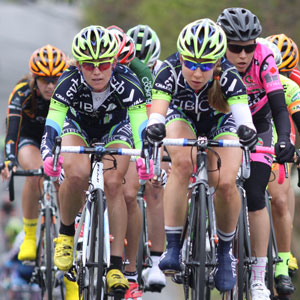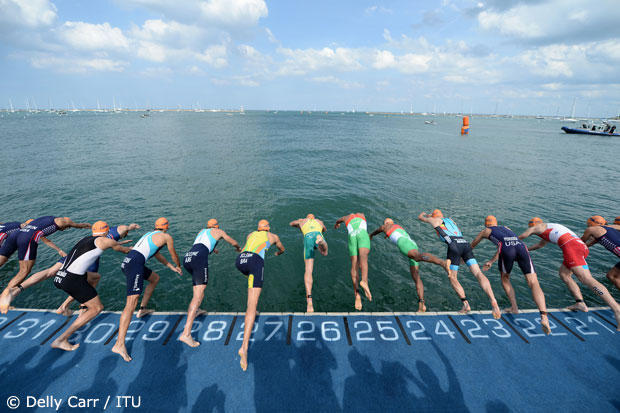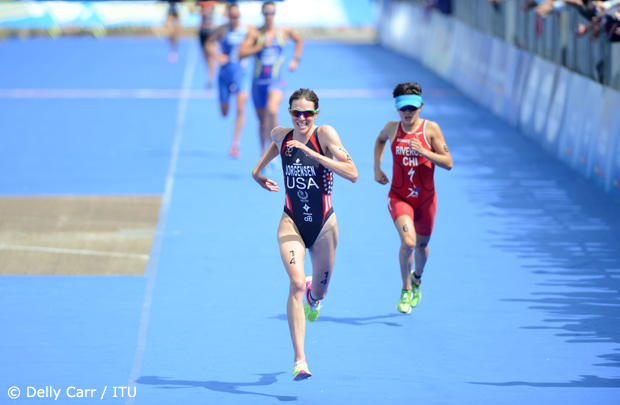AGs move closer to draft legal

The announcement was one short paragraph, and without detail. The International Triathlon Union (ITU) sent out a memo to all its daughter national federations (USA Triathlon is the "NF" in the United States) announcing that the ITU Sprint World Championship beginning in 2016 will now be draft legal. Not for elites, or juniors, all of whom race draft legal now. But for age group racers.
This announcement might sound like "nothing to see here" to some readers and DEFCON 5 to others, but it does grow in importance when you consider what will flow from this decision. I asked the ITU a number of questions about this, and below are replies to many of these questions.
The ITU exerts more direct control and leadership over Olympic and elite sport, less when it comes to age group sport. Understandably, the ITU does not want to seem imperious when making sweeping, impactful changes in the age group part of sport. Its very first sentence when I asked about this rules change was:
"This change was actually brought to us by a National Federation. We wouldn't make any rule changes to age group races unless presented in a Congress resolution, which is what happened. The Mexican Federation has been trialing draft-legal sprint races for a number of years and they found it to actually be safer and more cost effective, with the number of athletes able to compete increasing and with less race-time injuries occurring."
This might sound like the NFs all got together and voted for the age-group Sprint WC to be draft-legal, but the NFs only voted for the ITU's Technical Committee to study the issue and give their recommendations to the Executive Board. This is why the decision by the ITU took so many NFs by surprise. "This certainly has not been aired or socialized by the ITU," according to a long time board member of one NF.
Unclear at the time of the announcement was what rules would be in use. Could you still ride a tri bike or is it road bikes only? This morning the ITU's media manager, Erin Greene, wrote to Slowtwitch, "The age-group sprint will now follow draft-legal rules. Those rules state that bikes have to be draft legal, which means there would not be TT bikes and no long clip-ons allowed. The technical committee, however, will continue to review the rules for age group races throughout the implementation process."
This means road bikes only, with the use of short clip-ons. One assumes that the question of clip-ons at all will be broached between now and that 2016 race.
Why make this change, besides the fact that the Mexican and some other federations have advocated for it? I asked Ms. Greene, and here are the answers I got.
SLOWTWITCH: What, really, is the future of draft legal in triathlon, at least in terms of the races the ITU controls? Right now it's Sprint Worlds. What can the ITU tell our readers that is substantive, predictive and true about the future of the Olympic distance age group World Championship format?
ITU: ITU is foremost focused on getting events added to Major Games programs such as the inclusion of Mixed Relay into the 2020 Olympics. We will only review age group rule changes if brought to us as a resolution from a National Federation. However, that said, yes it is quite clear that we do support draft legal races in shorter distances. The elite athletes have competed in draft legal races for some time. Youth athletes and even potential professional athletes often compete in age group events, so there is a benefit in those races also being draft legal to assist the development of a pipeline to elite racing. There is also the added advantage of having one standard of racing for event organizers and technical officials to implement.
SLOWTWITCH: Following the theme of the question above, for 40 years nordic skiing has lived in peace with two formats: classic and skate, or free. In fact, one might say that the two formats are enshrined and celebrated, with the advent of the pursuit or skiathlon. What does the ITU want, for the future? Would it prefer that all triathlon be draft legal? Or would it prefer to see the two formats in age group racing side-by-side?
ITU: We will take each multiport and distance on a case by case basis, but ITU does support draft legal races in many occasions. Whether it is the best for every discipline is to be determined but we are not anti-drafting and would not immediately rule it out.
SLOWTWITCH: I gave you a couple of opportunities in my questions to say that, yes, both draft legal and no-draft have valid places in triathlon, and I really do not think you took the opportunity to acknowledge that. Rather, it seems to me you're saying that the ITU is for draft legal anytime and everywhere we can, age group and elite, and that's where we're taking this sport. That's my takeaway, and if my takeaway is wrong then I'd like the ITU to disabuse me of my bad interpretation of its remarks.
ITU: In regards to drafting, ITU absolutely recognizes the valid place of both draft-legal and non-draft legal styles of racing. We feel this change is more inclusive globally, as age group athletes now have the opportunity to choose to do either draft-legal or non-draft legal races at our World Championships. With the opportunity to compete in both styles, it no longer neglects those National Federations who do regularly organize draft legal age group events. And while ITU is open to any improvements in the competition formats, there is no further discussion for the time being to make any changes for Olympic or longer distance age group events.
In my opinion, the ITU would rather see draft-legal racing become ubiquitous in triathlon, but it is also sensitive (appropriately so) to its daughter NFs. I think a strong push from the NFs to make sure no-draft triathlon retains its rightful place would be heard by the ITU loud and clear. I also suspect that, absent that push-back, the ITU's default posture would be toward more and more draft-legal.
As for me, I'm not among the anti-draft-legal crowd. I raced my first triathlon in 1977. It was nordic ski, bike and run. My first swim, bike and run tri was in 1980. Four of my first five multisport races were draft-legal, the Hawaiian Ironman in 1981 being the only no-draft race. So, I'm used to it, or, I just don't fear it or think it's evil or dangerous. To me, it's all multisport, whether road, tri, MTB or gravel bike, draft or no-draft.
But the details of this become interesting. Unless the ITU rethinks this decision at the upcoming Congress at the Grand Final in Edmonton late next month (unlikely), the USAT will almost certainly qualify and field a national sprint championship, draft legal, qualifying a team for 2016 Worlds. (Would this mean 3 races at that USAT National Championship, Oly-no-draft, Sprint no-draft, Sprint-draft?) The location for that Worlds race has not been announced and probably will be announced at Edmonton. Depending on the location and timing of that 2016 Worlds venue, the qualifying for that 2016 Worlds team may take place as early as sometime in 2015. As of this writing it's mid-season 2014.
So, will that Worlds qualifier be the first race of that format for most contestants? Probably not. Hopefully not. But for this not to be the case, the U.S. will need races in this format during 2015. These races, if they are to be held, need to be contemplated now.
That means races will pop up on the schedule, next year, and you will be asked to register and participate. Will you? Will you want to? Do you own a road race bike? Are you intrepid enough to just show up and race, or do will you want to prepare in some way? What, in the form of skills and skill instruction, should there be?
What about rules? In bike racing it's typical to have several races ongoing, on a road, at one time. But it's frowned upon or downright forbidden to jump into the peloton of another category or age group. Will triathlon observe the same convention? Can it?
Will age-group draft-legal in the U.S. be a multi-loop phenomenon? Will racers be obliged to retire if lapped? Are the sorts of roads, cultures, laws, in countries like Spain and Mexico, where age group draft legal triathlons are common, analogous to what we see in the U.S.? These and many other questions will be asked, but one thing certain is that a number of races will pop up on your race calendar next year unlike any you've seen before.
USA Triathlon is still mulling the ITU's decision. USAT's board president, Barry Siff, is, like me, not averse to draft-legal for age-group racing, while he did note that he wants to make sure "we protect the tradition of no-draft racing that has grown up over the 40 years this sport has existed." How draft-legal age group racing might affect USAT's sanctioning processes, rules, insurance rates, he does not yet know.
We have a poll up on the Slowtwitch site, asking for reader feedback. We just put this poll up, and have fewer than 100 responses but as of now, maybe surprisingly, only a third of Slowtwitchers think this is an outright bad decision the ITU has made. A fourth say they're withholding judgment (never a bad idea). Another third think this should change should be extended to the Olympic distance age group race as well. Another similar poll of readers at irishtriathlon.com shows that less than half think it's an outright bad idea for age group racing to be draft legal. But only 18 percent think it should be legal always.





